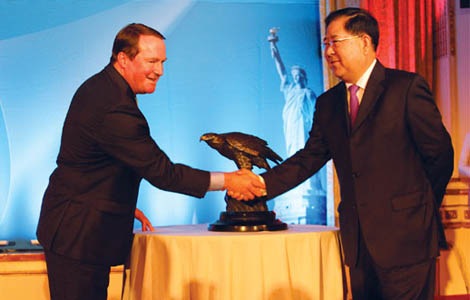Unique relation needs further tightening
Updated: 2014-08-18 04:18
By ZHANG YUCHEN in Beijing(China Daily Latin America)
|
||||||||
|
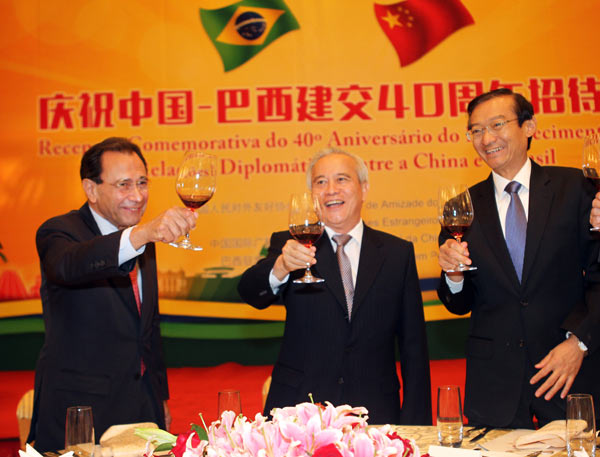 |
|
Wang Qinmin (center), vice-chairman of the National Committee of the Chinese People's Political Consultative Conference (CPPCC), Brazilian Ambassador to China Valdemar Carneiro Leao (left) and Chinese Vice-Foreign Minister Zhang Ming (right) at the celebration banquet held by Chinese People's Association for Friendship with Foreign Countries celebrating the 40th anniversary of the establishment of diplomatic relationship between China and Brazil in Beijing on Aug 15. Zou Hong / China Daily |
The relationship between China and Brazil is one of a kind in the realm of global economic and political cooperation, said Valdemar Carneiro Leao, Ambassador of Brazil to China, at an event in Beijing marking the 40th anniversary of the establishment of diplomatic ties between the two nations.
Joined by Wang Qinmin, vice-chairman of the National Committee of the Chinese People's Political Consultative Conference, and Zhang Ming, vice-minister of China's Ministry of Foreign Affairs at the anniversary day event on Aug 15, Leao described the outlook for the future of China and Brazil relations.
The uniqueness of bilateral relations between China and Brazil has been presented in extensive trade cooperation and harmonious collaboration in international political issues, Leao said.
"Among many important reasons for celebrating this anniversary is that over the past 40 years, the peoples of our two nations have built strong friendships and harvested its fruits," he said.
China and Brazil maintain frequent high-level dialogue in a variety of fields, including the increase in trade and investment. On a global level, China and Brazil have the same standing since they established their formal diplomatic relation in 1985, though the relationship was slow to get going for the first 10 years.
In 2004, then presidents Luiz Inacio "Lula" da Silva and Hu Jintao exchanged state visits, pledging to pursue a new era of mutually rewarding relations. In 2009, China became the top trading partner of Brazil.
Since 2012, when former premier Wen Jiabao visited Brazil, the two countries decided to enhance relations to a higher level of an overall strategic partnership, which proved, beyond improved short-term bilateral trading benefits, that China and Brazil are able to keep open the channels of communication and play a positive role in coordinating global issues.
"President Xi Jinping's visit to Brazil in July pushed the anniversary celebration to a peak. The visit can be seen as milestone of the further development of high-level communication between the two countries," said the Brazilian ambassador, adding that the visit also saw a new round of signing cooperative agreements in education, culture, sports, airplane industry, customs, investment, industry development, technology and more.
Among the highlights of the contracts signed during Xi's visit were EMBRAER's export of 60 aircraft to China and increased investment in Harbin by manufacturing business jets.
Brazil's exporting meets China's demand for agricultural and industrial raw materials such as iron ore.
From 2005 to 2013, trade volume between China and Brazil has been increasing by 23 percent annually, with the amount shooting up to $90 billion from $12 billion in the same time frame.
The ambassador also stressed the importance of enlarging investment on bilateral relations. As one of the most important partners in the Latin American region, the amount of investment reached $20 billion per year and there is still plenty of room to grow and diversify.
In the near future, Brazil plans to build 11,000 kilometers of new railroad, 7,000-km highway, and expand ports and airports — all of which means great opportunities in infrastructure investment. Also in these areas, China, with its experience and competitive capacity, is in a good position to get involved in these new phases of investment.
At the same time, both China and Brazil have optimistic outlooks on the relations of their peoples in terms of culture and educational exchange, said Xie Yuan, vice-president of the Chinese People's Association for Friendship with Foreign Countries.
Some 193 Brazilian students of the No Boundaries in Science program are now studying in China and the number of students will double next year. With Xi signing the teaching contracts, more opportunities can be offered to Brazilian young people who want to know Chinese culture and languages. In the near future, 5,000 Brazilian students would go to China to study, he said.
The two countries also share a commonality of interests in international forums including the BRICS. China and Brazil share the same progressive blueprint for the development and play a decisive role in the more important revolution, for instance, pushing the organizational changes by proposing the BRIC Development Bank and Reserves in the leader conference of BRIC on July 6.
"All these efforts prove that developing countries made their fundamental effort in global economic development," said Leao.
zhangyuchen@chinadaily.com.cn
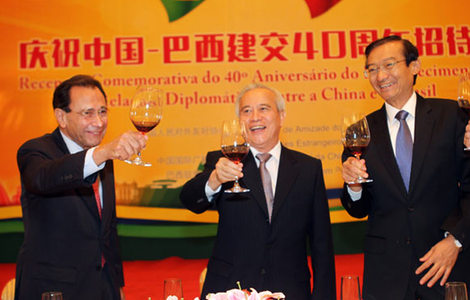
 Unique relation needs further tightening
Unique relation needs further tightening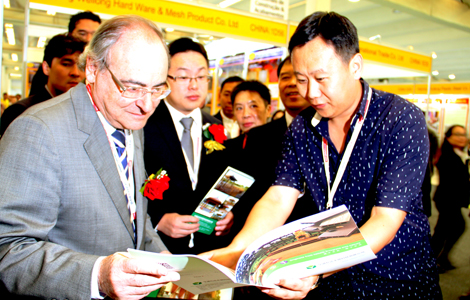
 Trade shows help Chinese firms to gain a foothold in Brazil
Trade shows help Chinese firms to gain a foothold in Brazil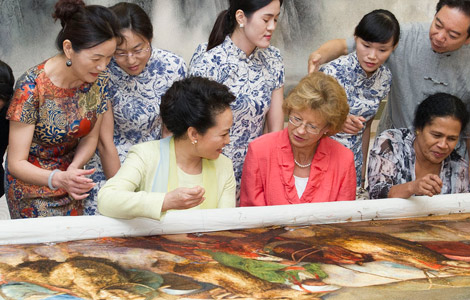
 First lady tours museum with wives of foreign leaders
First lady tours museum with wives of foreign leaders
 Passenger transport starts on Tibet's new railway
Passenger transport starts on Tibet's new railway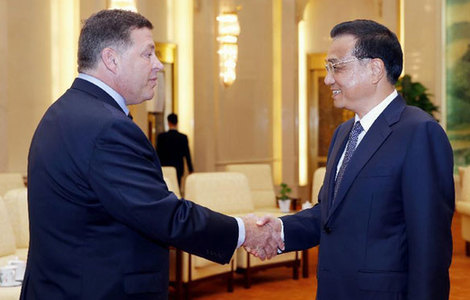
 China to help upgrade US transport network
China to help upgrade US transport network
 Youth Olympic Games kick off in Nanjing
Youth Olympic Games kick off in Nanjing
 Earthquake relief
Earthquake relief
 Delegation visits San Francisco to promote Canton Fair
Delegation visits San Francisco to promote Canton Fair
Most Viewed
Editor's Picks

|

|

|

|

|

|
Today's Top News
190,000 people in HK turn up for anti-Occupy march
Ebola outbreak interrupts Chinese companies in Liberia
Macao's Chui unveils political platform for chief executive election
Gov declares emergency, imposes curfew in Ferguson
APEC sets ball rolling for free trade
China's holdings of US securities take a slight dip
China seeks to conduct dialogue with Vatican
China opposes Japan PM's offering to Yasukuni Shrine
US Weekly

|

|

